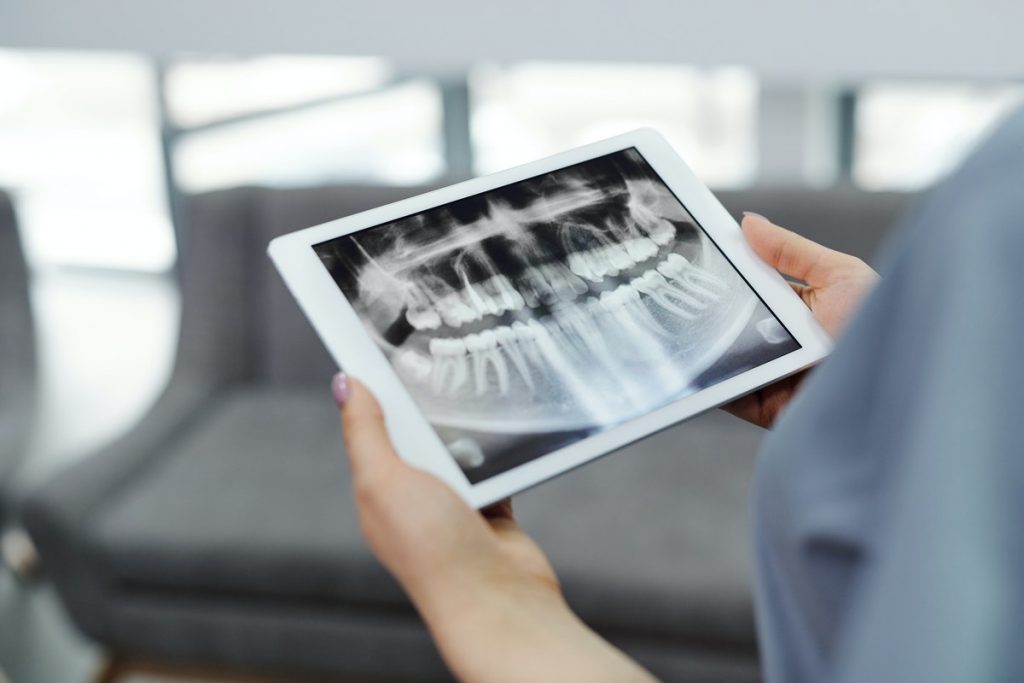Any type of pain is usually a sign that something is wrong. So, when you wake up and realize that your jaw is aching, it’s natural to be alarmed. “Why does my jaw hurt?” you might ask yourself (or Google).
Sudden jaw pains can be worrying. You might start thinking about dental issues like an abscessed tooth or a cavity or if you’ve been grinding your teeth while you sleep. The entire ordeal might sound serious, but in most cases, it’s not. Nearly everyone suffers from an aching or a swollen jaw at some point in their lives. So, know that you’re not alone in the struggle.
Jaw pain can develop due to a variety of reasons: issues with the blood vessels, toothaches, sinus infections and other conditions. Since many things can cause jaw pain, it can be difficult to determine if your pain is due to your jaw or something else.
Why Does My Jaw Hurt?
Your “why” when it comes to jaw pain might differ from the others. “Why does my jaw hurt on one side?” “Why does my jaw hurt when I eat?” “Why does my jaw hurt when I open my mouth?” No matter what your “why” is, it all boils down to “Why does my jaw hurt?”
The causes of jaw pain vary from one case to another. Consider the following.
Temporomandibular Joint and Muscle Disorder (TMD)
Temporomandibular joint and muscle disorder (TMD) (also known as TMJ) is one of the most common culprits behind jaw pain. It affects nearly 10 million people in the United States. Causes of TMD include the following:
- Injury to the jaw
- Pain from muscles that control jaw movement
- A displaced disc that cushions the jaw movement
- Excess stimulation of the jaw joint
Damage to the muscles or joints that control jaw movement can be caused by several factors, which include:
- Trauma to the jaw joint (for example you got hit in the face while playing sports)
- Teeth grinding
- Involuntarily clenching your jaw due to anxiety and stress
Dental Problems
Another potential cause of jaw pain is untreated dental problems. Common dental problems that cause jaw pain are cavities, abscesses, tooth sensitivity, wisdom tooth growth, cracked or crowded teeth, gum disease or misaligned teeth.
Visiting your dentist every six months for checkups and cleanings is an excellent way to diagnose dental problems and treat them before they start causing trouble (like jaw pain).
Trauma
Trauma occurs when you receive a hard hit to your jaw. In most cases, patients know the cause of their trauma. The pain can result from the following:
- A dislocated jaw. This can happen when you open your mouth too wide, such as when you yawn.
- A broken jaw. This results from a blow to the face or a fall.
- Dental surgery. This happens when you’re recovering from a procedure.
With trauma to the jaw, you might experience swelling, bruising, pain and knocked-out or loose teeth. If the pain doesn’t subside, you’re unable to open your mouth or you think something is broken, visit your dentist ASAP. Once the trauma heals, your jaw should be fine.
Heart Attack
A heart attack can cause pain in different areas of the body like your back, neck, arms, chest and jaw. Women in particular might experience jaw pain on the left side of their faces during a heart attack. If you experience the following symptoms, call 911 ASAP:
- Feeling faint
- Nausea
- Sweating
- Shortness of breath
- Chest discomfort
Cluster Headaches
These painful headaches can happen over a short period but still cause severe pain on one side of your head. Cluster headaches cause pain around or behind one of your eyes, but most of the time it radiates to your jaw.
Sinus Problems
Your sinuses are located under your eyes. When you experience inflammation for a longer period, it can result in chronic sinusitis. This condition makes breathing difficult, as well as causes pain and tenderness in the upper jaw. If you’re experiencing jaw pain and breathing difficulties due to sinus problems, visit your ENT for pain relief.
Diseases
Some diseases have jaw pain as one of their symptoms. For instance, mumps is a virus that triggers swelling of the glands on the sides of your mouth. This keeps you from being able to move your jaw, which causes pain in the jaw. Another disease that causes jaw pain is tetanus, which is a bacterial infection caused by a cut or scratch on your skin. Tetanus can stiffen your jaw muscles. It can also cause a lockjaw situation.
How Can I Relieve My Jaw Pain?
To experience immediate relief, keep the following steps in mind:
Apply ice or moist heat packs. Ice is usually your best friend during these situations. Place the ice in a sanitized plastic bag or wrap it in a thin cloth. Apply the ice pack to your face for 10 minutes. Take it off for another 10 minutes before putting it on your face again.
If ice doesn’t sound like a good idea, warm packs are another option. Run warm water over a washcloth, and then apply it to your jaw. The heat can relax your overactive jaw muscles. To continuously relieve the pain, re-wet the washcloth several times.
Massage the affected joint. Use your middle and index finger to press on the sore areas of your jaw. Rub in a circular motion for five to 10 rotations before opening your mouth and repeating the entire exercise. Massaging the sides of your neck could also relieve the tension.
Over-the-counter pain relievers. Medicines like acetaminophen and ibuprofen can help reduce discomfort.
How Can I Reduce Jaw Pain in the Long Run?

- Reduce your stress. Stress-relieving techniques can help you manage jaw clenching. These techniques could help reduce your jaw pain if it’s due to stress. Consider the following activities:
- Meditation
- Journaling
- Yoga
- Avoid eating chewy foods. Foods that are chewy, crunchy or tough can strain your jaw joints and lead to pain later. Avoid jaw pain by avoiding these foods:
- Ice
- Chewing gum
- Jerky
- Apples
- Avoid caffeine. Your favorite cup of coffee could be causing jaw pain. Caffeine can contribute to muscle tension. Reduce jaw pain by avoiding large amounts of caffeinated tea or coffee.
- Seek treatment. Most doctors will recommend non-surgical treatment methods for your pain first. Some of these methods include:
- Muscle relaxers
- Mouthguard
- Botox injections
If these methods don’t work, your dentist might recommend jaw surgery.
Jaw pain is never fun for anyone. So, if your jaw has been aching for a while, it’s time to visit your doctor immediately.

